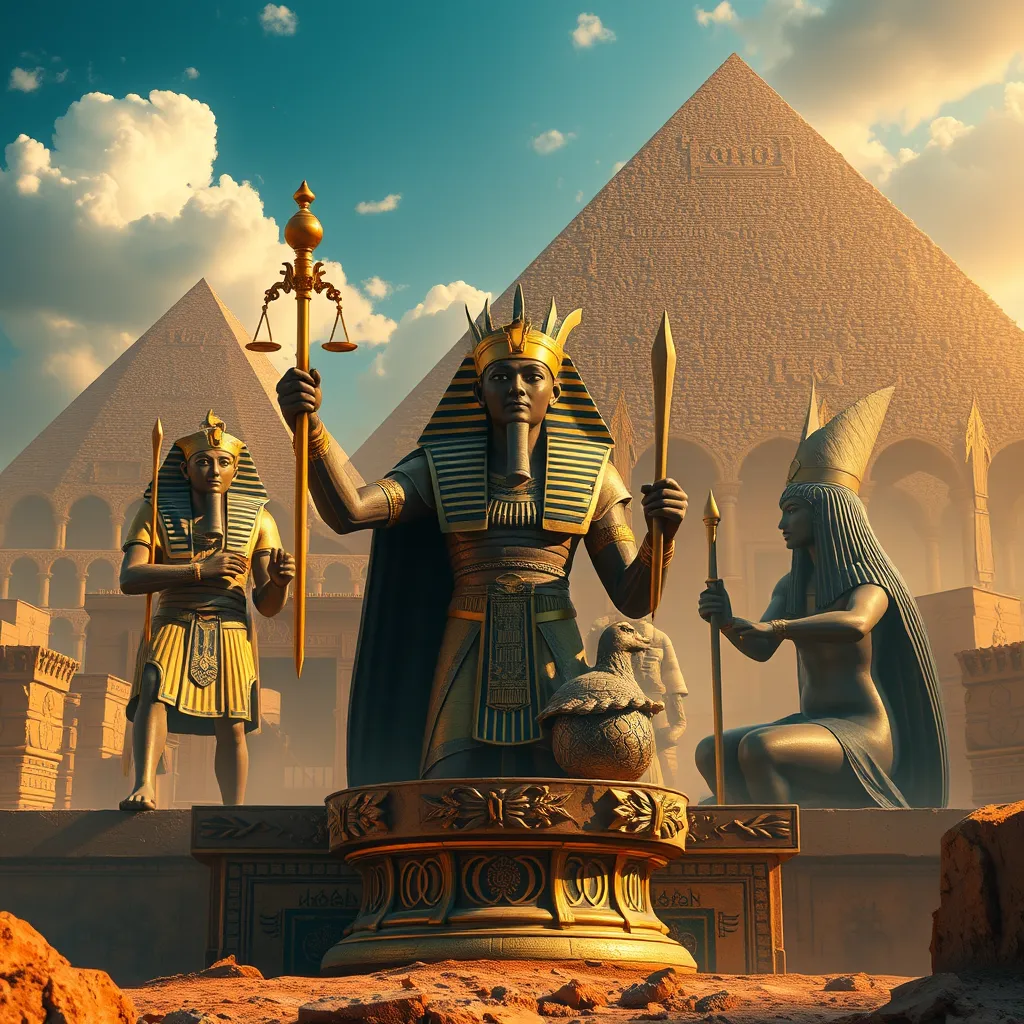The King’s Judgement: The Myth of the Pharaoh’s Responsibility to the Gods
I. Introduction
The Pharaohs of ancient Egypt held a unique and exalted position within their society, acting not only as rulers but also as divine representatives on Earth. Their authority was intertwined with a belief system that emphasized divine kingship, where the Pharaoh was seen as an embodiment of the gods. This article aims to explore the myth of the Pharaoh’s responsibility to the gods, illuminating the significance of divine kingship and its implications for leadership in ancient Egypt.
II. The Concept of Divine Kingship
Divine kingship in ancient Egypt refers to the belief that the Pharaoh was chosen by the gods to lead the people and maintain cosmic order. This concept evolved over centuries, influenced by various dynasties and cultural shifts.
- Definition: Divine kingship embodies the idea that the Pharaoh was both a political leader and a spiritual figure, directly connected to the divine.
- Historical Context: The role of the Pharaoh transformed from a warrior leader to a god-like figure who was responsible for the welfare of the nation.
- Relation to the Gods: The Pharaoh was believed to have a unique relationship with the gods, acting as their earthly counterpart.
III. The Pharaoh as a Mediator
As the mediator between the gods and the people, the Pharaoh played a crucial role in maintaining Ma’at, the ancient Egyptian concept of truth, balance, and cosmic order.
- Intermediary Role: The Pharaoh was responsible for communicating the needs and desires of the people to the gods.
- Rituals and Responsibilities: This included performing rituals, building temples, and offering sacrifices to appease the gods.
- Key Texts: Inscriptions in temples and tombs often highlight the Pharaoh’s duties, reinforcing their role as a divine mediator.
IV. Myths Surrounding the Pharaoh’s Accountability
Various myths illustrate the Pharaoh’s divine judgement, including narratives that portray their ultimate accountability to the gods.
- Myths of Divine Judgement: Stories such as the Weighing of the Heart emphasize the belief that the Pharaoh’s actions would be judged in the afterlife.
- Specific Stories: The myth of Osiris, where the Pharaoh’s integrity and adherence to Ma’at were crucial for his acceptance by the gods.
- Cultural Implications: These myths shaped societal expectations, holding leaders accountable to divine standards.
V. Historical Case Studies of Pharaohs
Examining specific Pharaohs offers insight into how their perceived responsibility to the gods influenced their reigns.
- Notable Pharaohs: Figures like Ramses II and Akhenaten exemplify different approaches to divine kingship.
- Divine Favor: Successes, such as victories in battle, were often attributed to divine favor, while failures could lead to a loss of legitimacy.
- Failures and Successes: The contrast between Pharaohs who adhered to religious practices and those who deviated illustrates the consequences of divine accountability.
VI. The Role of Priests and the Religious Establishment
The priests played a significant role in shaping the narrative of the Pharaoh’s divine obligations, often acting as powerful figures within the religious landscape.
- Influence of Priests: Priests were essential in interpreting the will of the gods and performing rituals that reinforced the Pharaoh’s authority.
- Political Power and Religious Authority: There was a complex interplay between the Pharaoh’s political power and the priests’ religious authority, sometimes leading to tension.
- Challenging Accountability: The priesthood could either reinforce or challenge the notion of the Pharaoh’s accountability based on their interests.
VII. The Decline of the Divine Kingship Concept
Over time, various historical factors contributed to the erosion of the Pharaoh’s divine authority.
- Historical Factors: Foreign invasions, economic troubles, and internal strife weakened the centralized authority of the Pharaoh.
- Shifts in Beliefs: Changes in religious practices and the rise of new cults diluted the traditional notion of divine kingship.
- Impact of Invasions: The arrival of foreign powers, such as the Persians and Greeks, undermined the perception of the Pharaoh as a divine figure.
VIII. Conclusion
In summary, the myth of the Pharaoh’s responsibility to the gods is a complex interweaving of divine kingship, cultural narratives, and historical realities. The Pharaohs were seen as mediators who maintained Ma’at, and their accountability to the divine shaped Egyptian society and its expectations of leadership. This legacy continues to influence modern interpretations of power and responsibility, reminding us of the profound connection between mythology, leadership, and culture in ancient Egypt.




